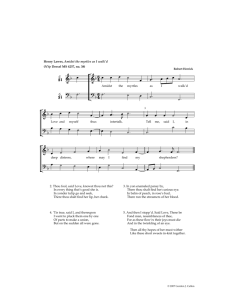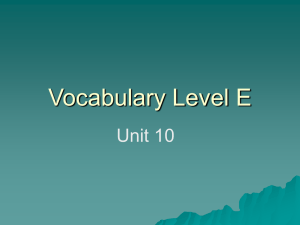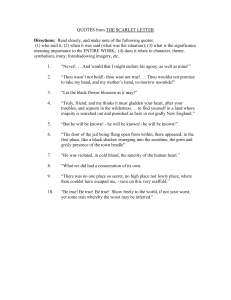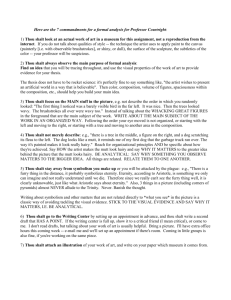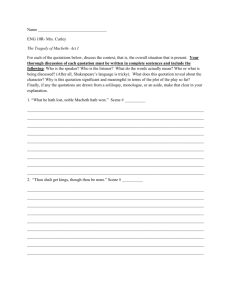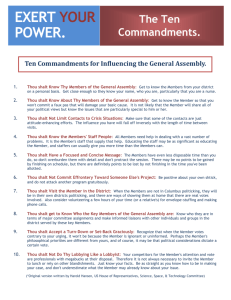File - Toombs County Schools
advertisement
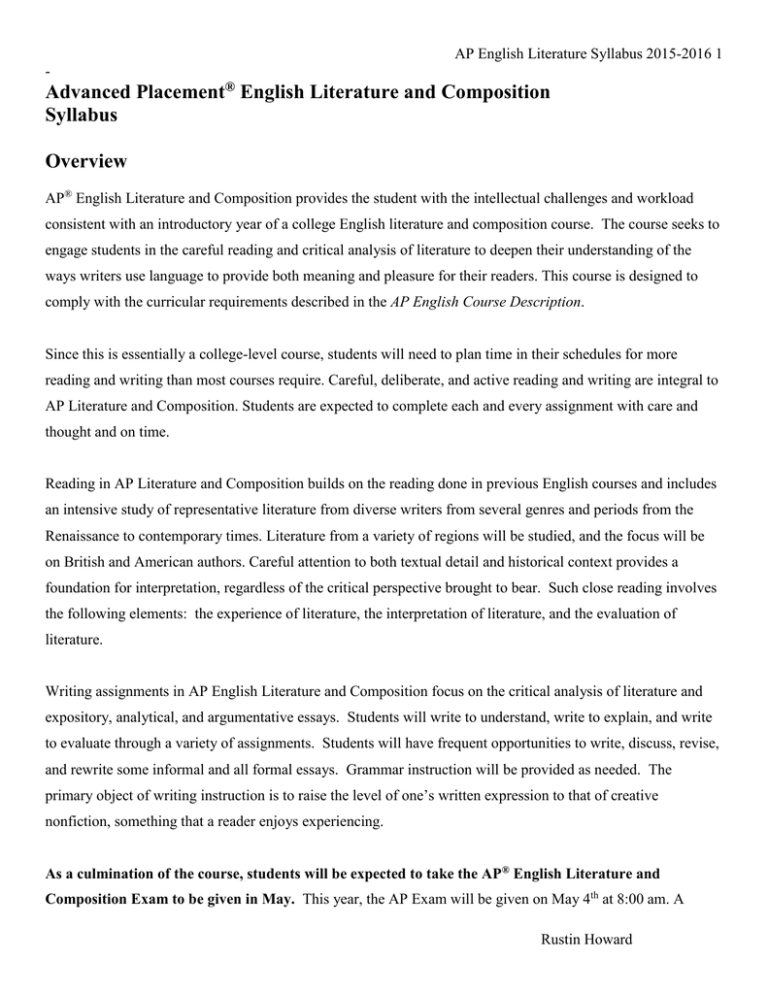
AP English Literature Syllabus 2015-2016 1 - Advanced Placement® English Literature and Composition Syllabus Overview AP® English Literature and Composition provides the student with the intellectual challenges and workload consistent with an introductory year of a college English literature and composition course. The course seeks to engage students in the careful reading and critical analysis of literature to deepen their understanding of the ways writers use language to provide both meaning and pleasure for their readers. This course is designed to comply with the curricular requirements described in the AP English Course Description. Since this is essentially a college-level course, students will need to plan time in their schedules for more reading and writing than most courses require. Careful, deliberate, and active reading and writing are integral to AP Literature and Composition. Students are expected to complete each and every assignment with care and thought and on time. Reading in AP Literature and Composition builds on the reading done in previous English courses and includes an intensive study of representative literature from diverse writers from several genres and periods from the Renaissance to contemporary times. Literature from a variety of regions will be studied, and the focus will be on British and American authors. Careful attention to both textual detail and historical context provides a foundation for interpretation, regardless of the critical perspective brought to bear. Such close reading involves the following elements: the experience of literature, the interpretation of literature, and the evaluation of literature. Writing assignments in AP English Literature and Composition focus on the critical analysis of literature and expository, analytical, and argumentative essays. Students will write to understand, write to explain, and write to evaluate through a variety of assignments. Students will have frequent opportunities to write, discuss, revise, and rewrite some informal and all formal essays. Grammar instruction will be provided as needed. The primary object of writing instruction is to raise the level of one’s written expression to that of creative nonfiction, something that a reader enjoys experiencing. As a culmination of the course, students will be expected to take the AP® English Literature and Composition Exam to be given in May. This year, the AP Exam will be given on May 4th at 8:00 am. A Rustin Howard AP English Literature Syllabus 2015-2016 2 student who earns a grade of 3 or above on the exam will be granted college credit at most colleges and universities throughout the United States. Students should be aware of the requirements of his or her college of choice. Course Outcomes In this course, students will improve close reading and analytical strategies; stretch their imaginative abilities in reaction to a wide variety of literature; improve their ability to find, explain, and defend (through discussion and writing) what is of value in literature; become familiar with the purposes and strategies of rhetoric in order to o develop an effective use of rhetoric, including controlling tone, establishing and maintaining voice, and achieving appropriate emphasis through diction and syntax, o improve organization in writing through techniques to improve coherence, such as repetition, transitions, and emphasis, o effectively state, support, and explain their claims in their arguments; advance vocabulary skills to cope with unfamiliar language. Literature Representative literature from both British and American writers from several genres and periods from the Renaissance to contemporary times will be selected from the following anthologies: Primary Text: Jago, Carol, Shea, Renee, Scanlon, Lawrence, and Aufses, Robin. Literature and Composition Reading Writing and Thinking 1st Ed. Boston: Bedford/St. Martin’s, 2011. Print. Secondary Texts: Other novels, plays, short stories, essays, and poems as outlined in the course content below. English translations of works by non-British and non-American authors may also be assigned from time to time. Currently, students will have studied world literature and American literature prior to AP English Literature and Composition. The specific selections from anthologies and novels studied in AP English Literature and Composition may vary somewhat from year to year; however, the scope of required readings will always range from the Renaissance to contemporary times and include major writers of poetry, drama, short story, and novel. Rustin Howard AP English Literature Syllabus 2015-2016 3 - Writing The course teaches students to write an interpretation of a piece of literature that is based on a careful observation of textual details, considering the work’s structure, style, and theme; the social and historical values it reflects and embodies; and other elements such as the use of figurative language, symbolism, and tone. Students will have frequent opportunities to write, discuss, revise, and rewrite formal, extended analyses and timed, in-class responses. Informal writings generally will not require revision or rewriting, but students are encouraged to revise formal papers. Students will be expected to engage in the following types of writing: Writing to understand: Informal, exploratory writing activities that enable students to discover what they think in the process of writing about their reading, such as annotation, freewriting, journaling, and response/reaction papers. These writing assignments will generally be done before discussion of the reading assignment and will generally not require revision or rewriting. Their primary purposes are to promote close reading of the literature and to stimulate thinking and discussion. These writings will be counted in the daily grades category. Writing to explain: Formal expository, analytical essays in which students draw upon textual details to develop an extended explanation/ interpretation of the meanings of a literary text. These writings will often be done after workshopping the particular reading assignment. These types of writings will be counted as a task. Writing to evaluate: Formal analytical, argumentative essays in which students draw upon textual details to make and explain judgments about a work’s artistry and quality, and its social and cultural values. These will count as a task grade. The AP teacher will provide instruction and feedback on students’ writing assignments, both before and after students revise their work, through workshops and student-teacher conferences. All formal essays (writing to explain and writing to evaluate) will be assessed according to the goals listed below. Grammar instruction will be provided as needed. The goal here is to help students develop the following: A wide-ranging vocabulary used appropriately and effectively; A variety of sentence structures, including appropriate use of subordination and coordination; Logical organization, enhanced by specific techniques to increase coherence, such as repetition, transitions, and emphasis; A balance of generalization and specific, illustrative detail; An effective use of rhetoric, including controlling tone, establishing and maintaining voice, and achieving appropriate emphasis through diction and syntax; Creative nonfiction – a critical analysis need not be dull. Rustin Howard AP English Literature Syllabus 2015-2016 4 - Pedagogy/Methods of Instruction This AP English Literature and Composition course will be carried on as a series of workshops in which we converse about the literature we read and the writing we do. In order to grow into mature, independent critical thinkers, students will need to participate in these discussions and workshops actively. In many instances, the teacher will serve as only a facilitator, not a guiding force. In these workshops we will discuss the art and craft of imaginative literature and the historical, social, and cultural environments influencing those works, as well as our reactions and discoveries. We will also discuss the art, craft, and conventions of writing and work to resolve issues presented by specific writing assignments. Discussion in this course will be both large group and small group and often student-led. Cooperative learning groups are also used in this course, both for discussing literature and writing or revising. Quizzes, Exams, Grades Students can have a quiz at anytime over anything that has ever been discussed or assigned during this course. Quizzes are intended not to punish but to foment commitment to success in this course. We all need a push sometimes. Tests/exams will be given periodically, at the conclusion of major units of study. As often as possible, these tests will be created in the style of the AP English Literature and Composition Exam. Grades reported on official report cards, except the last, may be considered progress reports. (See “Thoughts on Grades” below.) Practice AP English Literature and Composition exams, both multiple choice and writing, will be given periodically and then intensely before the AP English Literature and Composition Exam is given in May. There will also be a category for grading called “AP Practice.” This practice will be put into the gradebook as progress monitoring but will be assigned a percentage of “0” so that it is not figured into a student’s grade. Occasionally these assignments will be used as a daily grade, but the score will not be a “raw” score; It will be “curved.” However, the grade put into the “0” percentage category can be considered a “raw” score. Grading Scale Course Work Percent of Final Grade Performance Tasks: Out-of-class writings and other “BIG” assignments 40% Tests/Quizzes: 30% Daily: In-class writings, discussion, and activities 30% AP Practice 0% Thoughts on Grades What raises writing to creative nonfiction and literature to more than a story is often an elusive quality. What makes a student’s work worth an A or a B is often just as difficult to define. Grades in the traditional sense are almost always only part of the truth. Although all grades count, any student who makes a commitment to real meritorious success and, at least, improvement will have the right grade in the end. What I’m saying is, even if you write “F” essays and are lax or inattentive in your reading at the beginning, you can commit to improving your writing and reading and end up with an A as your grade. By all means, commit to this course, which means doing every assignment with thought and care, in order to receive the best grade possible. Even if you score less than 3 on the AP English Literature and Composition Exam, you can still pass the course to satisfy the senior English requirement and benefit from the journey. Rustin Howard AP English Literature Syllabus 2015-2016 5 - Elements of the Course Weekly vocabulary to include SAT prep words, key literary terms, and vocabulary in the context of the literature Grammar instruction as needed to address areas of concern as noted in compositions Periodic quizzes on reading Frequent class discussions in a variety of formats (e.g., Socratic Seminars, Fishbowls, debates, gallery walks, etc.) Weekly in-class, timed essays in response to the literature read Formal essays (3-5 pages) on a regular basis, with conferences with teacher to follow for feedback and suggestions for revision Tests over the literature read patterned after the multiple choice section on the AP English Literature and Composition exam Essay Tests patterned after the essay section of the AP English Literature Course Exam Formal essays and/or presentations as a culminating activity for each unit Regular practice in preparation for the AP English Literature and Composition Exam (including multiple choice and free-response) Classroom Policies and Procedures Materials Needed One 1” – 1 ½” 3-ring binder Pencils and pens with blue or black ink Notebook paper Highlighters Jump Drive/ Flash Drive (Optional) Access to a computer Summer Reading: Students were asked to read The Invisible Man as a summer assignment. If you did not read it, you will have the time to read it over the next couple of weeks before any assignment is due. Honors Integrity All students in AP English Literature are expected to submit work of their own authorship. Borrowing work, ideas, or answers in any way without giving credit for its origin will not be tolerated. Plagiarism is any form will result in a grade of zero. In addition, parents will be notified and a discipline referral will be written. Reading Rustin Howard AP English Literature Syllabus 2015-2016 6 Much of your reading will be completed at home. Please be aware that not reading will result in poor performance in this class and ultimately the AP exam. Late Work Late work will not be accepted. If you are absent from school, it is your responsibility to obtain missed assignments; you will have three days to complete missed assignments. Restroom Policy Many times going to the restroom becomes a persistent problem. Students ask to leave the room to use the facility, but they end up going to the bathroom just to have a few minutes out of class. This impairs the students’ learning thus impairing their test scores and my evaluation. Students will be given two restroom passes per semester to use during class. They will sign out of class to go to the restroom. They are given ample time between classes to use the restroom, so it should not be an issue. If students use more than the two passes, they will have to serve after school detention for each time they sign out of the classroom. If a student has an issue that requires him or her to use the restroom regularly, please let me know, and an exception will be made. This MUST be communicated in writing. Class Expectations Bring all materials to class daily. I will not have extras for you. Be in class, in your seat, and working on the assignment on the board when the tardy bell Be respectful of everyone at all times. rings. All work must be legible; if I can’t read it, it is Assignments are not intended to be simply wrong! completed, but completed with your highest Follow all rules as outlined in the student effort. handbook. Consequences Verbal or non-verbal warning Parent contact Office referral In the case of severe disruption, you will be sent immediately to the office Important Notes The bell does not dismiss the class. Do not leave your desk until I give permission. Misbehaving while a substitute or guest is present will result in severe discipline. DO NOT get up during class unless given permission. Throwing trash away is not a good excuse. You MUST wait until the appropriate time. If you need to use the restroom, wait for an appropriate time. FOOD, DRINKS, GUM, are not allowed in the classroom at anytime, for any reason. If these items are seen, they will be confiscated according to school policy. Cell phones are allowed when appropriate. Unless given permission to use cell phones, you MUST keep these devices concealed. Do NOT enter the room, leave your seat, or disrupt another student’s presentation. This is rude and disrespectful and will NOT be tolerated. Rustin Howard AP English Literature Syllabus 2015-2016 7 - Course Content Semester One First Grading Period Topic/Unit -- Introduction to AP Course and Exam/Writing Approximate # of Weeks: 2 In this unit, students will become familiar with a variety of techniques and strategies as part of an overall introduction to the course. In order to appreciate the caliber of writing expected throughout the course and on the AP exam, students will analyze and critique exemplary writing samples (including, but not limited to, sample college application essays) in terms of language, style, tone, purpose, audience, organization, etc. Students will practice writing AP level essays using former AP exam questions. As a culminating assessment, students will compose their first formal paper for the class—an essay over summer reading of The Invisible Man. The teacher will provide feedback for revision. The other main goal of this introduction to the course involves modeling and teaching close reading and annotation strategies as a foundation for the study of literature throughout the course. Using Robert Frost’s “The Road Not Taken,” the teacher will model how to do a close reading of a poem and how to annotate it effectively. The students will then apply these strategies to the reading of a new poem and will complete an annotation and close read followed by a short constructed response. Topic/Unit –England: Where it Began- Including the Anglo-Saxon and Medieval Period of British Literature Approximate # of weeks: 3 During this unit, students will learn about the Anglo Saxon and Medieval Period of British Literature. Students will read excerpts from Beowulf and The Canterbury Tales as well as short poems that are also part of the period. Short essay topics will be assigned as well as an interactive project based on The Canterbury Tales. Topic/Unit – The Nature of Good and Evil- Including the Renaissance Period of British Literature Approximate # of weeks: 3 Students will be introduced to the Renaissance Period of British Literature. In this unit, students will, of course, explore the Shakespearean tragedy and film versions in terms of dramatic conventions, characterization, and universal themes. This unit examines characters in situations that force them to choose to act morally or immorally. Our laws or culture codes usually determine our actions or inactions. Our culture codes and moral Rustin Howard AP English Literature Syllabus 2015-2016 8 values surface when we read and examine literature. One’s reaction to a character’s choices helps him understand his own moral code. Students will use William Shakespeare’s The Tragedy of Macbeth as a primary texts and will examine the differences in characters. Throughout the reading of the play, students will participate in class discussions and a Socratic Seminar, and students will create a fever chart throughout the reading of the play to trace Macbeth’s level of insanity, feigned or genuine. In addition, students will create an additional “fever chart” by choosing a topic/theme/character to trace throughout the play. This will serve as the foundation for the final, formal culminating paper (3-5 pages) for which the students will be given no topics. Each student must find his/her own thesis and craft an analysis of the play. Thesis statements will be checked and approved before writing begins. Teacher will read and critique the essay and return it to students for revision. Resources include but are not limited to: Various clips of film versions, both contemporary and classic, for comparison purposes Selected poems to analyze for thematic comparison Second Grading Period Topic/Unit – Identity and Culture- Including the Romantic Period of British Literature Approximate # of Weeks: 4 Students will be introduced to the Romantic Period of British Literature. Students will read Frankenstein independently and will engage in class discussions and activities that will focus on an exploration of the novel as it exemplifies the characteristics of Gothic literature, the reliability of the multiple narrators, and the issues of nature vs. nurture, scientific ethics, identity, culture, and the value of knowledge. Students will perform close reads utilizing pieces of gothic literature. After reading, in cooperative learning groups, students will complete a body biography assignment in which they psychoanalyze a character from the novel as a way to examine society’s view of identity. After analyzing a character from the novel, students will analyze themselves and complete a visual interpretation of who they are as they see themselves. Students will choose a partner who will then create a visual interpretation of them. Students will present these projects that will follow with a class discussion based on a person’s view of themselves verses society’s view on that person. Resources for this unit include, but are not limited to, the following: Frankenstein by Mary Shelley “The Rime of the Ancient Mariner” by Coleridge Other Gothic Poetry Photos of Gothic architecture Rustin Howard AP English Literature Syllabus 2015-2016 9 - Topic/Unit- Love and Relationships- Including the Victorian Period of British Literature Approximate # of Weeks: 4 Students will be introduced to the Victorian Period of British Literature. This unit examines the themes of love and relationships. During this unit, students will focus on Oscar Wilde’s British drama, The Importance of Being Earnest. Students will examine gender roles determining both a males’ and females’ positions in relationships and marriages. Students will discuss drama as a genre citing the differences between reading the play verses viewing the play. Students will also relate this British drama, which is considered a comedy, to Shakespeare’s Macbeth, a tragedy. Students will write a compare and contrast essay citing similarities and differences in the two, proving each their respected type. Students will take a close look poems such as but not limited to “The Flea,” One Art,” “She walks in Beauty,” “True Love,” surrounding the theme of love and will explicate them using TPCASTT. Resources for this unit include, but are not limited to, the following: The Importance of Being Earnest by Oscar Wilde The Kiss by Gustav Klimt Semester Two Topic/Unit -- Introduction to Poetry Approximate # of Weeks: 4 In this unit, students will read, discuss, and write about various poems. Selected chapters in Literature and Composition Reading Writing and Thinking about the reading and analyzing of poetry will inform the students’ reading of poetry. The teacher will model several analysis strategies, including DIDLS and TPCASTT. Students will complete on-demand, in-class written explications of selected poems, beginning in groups and then individually. The unit will culminate with a final, formal paper in which students use textual details to interpret and analyze a poem on their own. They may share these papers with the class. A sampling of poems to be read is listed below: “The Red Wheelbarrow” by William Carlos Williams “Bright Star, would I were stedfast as thou art” by John Keats “My Father’s Song” by Simon Ortiz “Promises like Pie-Crust” by Christiana Rossetti “Do Not Go Gentle into That Good Night” by Dylan Thomas Other selected poems from Literature and Composition Reading Writing and Thinking Rustin Howard AP English Literature Syllabus 2015-2016 10 - Topic/Unit – Individual vs. Family/Society Approximate # of Weeks: 4 In this unit, students will prepare to read The Awakening with a close reading of Chopin’s “The Storm” and a review of “The Story of an Hour” (students typically read this story in the prerequisite course). Students will identify common themes in the stories and begin making predictions about The Awakening based on the conventions of the 19th century. After reading and annotating the novel independently, students will participate in class discussions and complete an in-class writing assignment concerning the themes but also the female characters as archetypes. Ibsen’s A Doll House serves as a fitting companion piece to The Awakening for the purposes of comparison. Following the reading of the play, students will debate the relative courage and selfishness of the two women—Edna Pontellier and Nora Helmer. Finally, the unit will conclude with a formal paper (3-5 pages) in which students compare the two works. Resources/texts for this unit include, but are not limited to, the following: The Awakening by Kate Chopin A Doll House by Henrik Ibsen “The Storm” by Kate Chopin “The Story of an Hour” by Kate Chopin Selected poems for comparison: “Cinderella” by Anne Sexton and “A Work of Artifice” by Marge Piercy Topic/Unit – The Modern Day Tragic Hero Approximate # of Weeks: 3 This unit will begin with a review of tragedy and tragic heroes as students revisit Macbeth and reviews Romeo and Juliet. Throughout the unit, students will read, annotate, and discuss the plays in terms of diction, tone, symbols, themes, and motifs. In addition to examining the plays in light of the classical definition of tragedy, students will consider such topics as capitalism, happiness, and the pursuit of the American Dream. Following discussions and an in-class timed writing, students will conclude the unit with a formal comparative essay on a topic of their choice. Students may compare The Death of a Salesman and Fences, or they may compare either of the plays to another work (e.g., examining the female characters as they compare to the female characters in The Importance of Being Earnest, The Awakening, or The Dollhouse.) Resources/texts for this unit include, but are not limited to, the following: The Death of a Salesman by Arthur Miller Fences by August Wilson Rustin Howard AP English Literature Syllabus 2015-2016 11 “Tragedy and the Common Man” by Arthur Miller Critical essays discussing Aristotle’s definition of tragedy Topic/Unit: Short Fiction Approximate # of weeks 3 Students should be able to pinpoint and clearly explain the particular effect an author achieves in a piece of short fiction and show how the author achieves that effect through the use of such elements as symbols, imagery, diction, and organization. Students will complete a research assignment using one of the stories that they have read and write an original and complete evaluation of the story’s artistry, quality, and social and cultural values analyzing and discussing the behavior of people. Students may use up to 3 sources for this assignment but no more. Theories of why people behave the way they do may come from the fields of psychology, philosophy, theology, political science, or sociology. Resources/texts for this unit include, but are not limited to, the following: A Rose for Emily by William Faulkner The Yellow Wallpaper by Charlotte Perkins Gilman Everyday Use by Alice Walker Good Country People by Flannery O’Connor Topic/Unit – Preparing for the Exam Approximate # of Weeks: 2 Prior to the AP exam, we review and practice close reading and analysis strategies, using “fresh” poems and selections from old AP exams. Students practice both multiple-choice and essays. Students will use rubrics to assess their own writing and then revise for improvement. Resources for this unit include, but are not limited to, the following: Select poems from Literature and Composition Reading Writing and Thinking Old AP Literature exams Rustin Howard AP English Literature Syllabus 2015-2016 12 - The Ten Commandments of AP Literature 1. I am the Prompt, thy Prompt; thou shalt have no other Prompt before me. Thou shalt read the Prompt with rapt attention; the Prompt is thy friend. Thou shalt address the Prompt. Thou shalt not just get the general idea of the Prompt, nor shalt thou fight the Prompt or substitute thine own ideas for the Prompt. 2. Thou shalt not postpone, omit or bury thy Thesis Statement. 3. Thou shalt not commit plot-summary, nor shalt thou cohabit with Padding of Writing, for it is an abomination in my sight. 4. Thou shalt not commit free-floating generalization, but shall support and develop thy every assertion. 5. Thou shalt not confuse complexity with confusion, or subtlety with indecisiveness; thou shalt not attribute thine own insensitivity or ignorance to authorial ineptitude. The fact that thou gettest not the point doesn't mean that the passage hath no point: thou hast missed the point. Deal with it. 6. Thou shalt read every MC question with the same exquisite care that thou devotest to the Essay Prompt: thou shalt not 'get the drift.' By the same token, thou shalt strive to read what the writer actually wrote, not what thou expectest him or her to have written. 7. Thou shalt not finish early. Thou shalt spend plenty of thy time planning thine essay responses and reading them over. 8. Thou shalt guess when thou knowest not the answers and can eliminateth two of the four answers. 9. Thou shalt not merely identify rhetorical, stylistic, or literary devices, but shalt show how they function. 10. Thou shalt never permit thyself to become discouraged: I am the prompt, thy Prompt. Thou shalt maintain thy focus, attention and confidence. Yea, though thou hast totally screwed up thy last essay, this next essay maketh a fresh start. Rustin Howard

